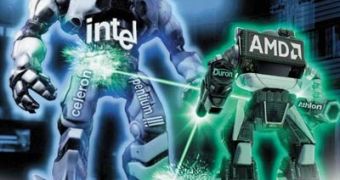Intel and AMD, the two major players on the processor market, have been rivals for what seems like forever. Because of this "war", we, customers, saw a number of things quickly change. First of all, prices dropped like crazy all over the globe (long gone are the days when you had to spend all your paycheck for a low-end processor) then, maybe even more importantly, their competition pushed the technology further. Let's see, between the first x86 processor and its predecessor there were a couple of years and now I simply don't know if to upgrade my system (24 months old and quite obsolete) or simply to sit back and just "patch" it, because in a few months, a new processor family will be available.
Like everyone interested in a CPU upgrade I have to make a tough choice: Intel or AMD? Well, there is no right or wrong answer to this question, as each customer is choosing what he thinks works best for him. Each user preference is different, just like each user's reason for buying a particular processor is; one could buy a better and faster CPU for the latest games (I sometimes think there is a conspiracy between hardware and games producers) or for number crunching or a million other reasons (price included).
If you want a good processor (both performance and power consumption-wise) and you don?t want to spend too much on it, AMD should be your choice. They recently hacked and slashed all their prices from near phased out CPUs to top of the line models. Intel is said to follow AMD's lead and start cutting some prices too, but as a general rule, Intel's products have always been a "little" more expensive.
One other BIG thing to remember when you are looking for a new processor is to ask yourself if you want to replace the memory and the motherboard as well. Most new processors from AMD require you to do just that. Let's see, we had the long lived A socket, then came the 754 (as a tuned down version of 939), the 939 itself, the AM2 and now there are rumors about an AM2+. I mean, one platform change is fine by me, two at most, but come on people, four or five ?!? At least customers could use plain old DDR memory on the first platforms, but to use the AM2, DDR2 is needed. On the other hand, Intel is not changing platforms and sockets every 6 months, so users would not have to buy a new motherboard (and possibly RAM) as well.
Now both producers' CPUs are performing about equally in benchmarks, Intel's strong point is the integer unit, while AMD smokes all floating point benchmarks. In the end, users need processors that perform just as good in real life situations too, not just in synthetic benchmarks. So whatever platform you may choose, make sure first that it is the right one for you in terms of performance and costs.

 14 DAY TRIAL //
14 DAY TRIAL //